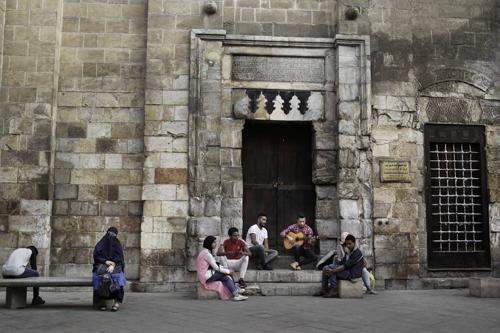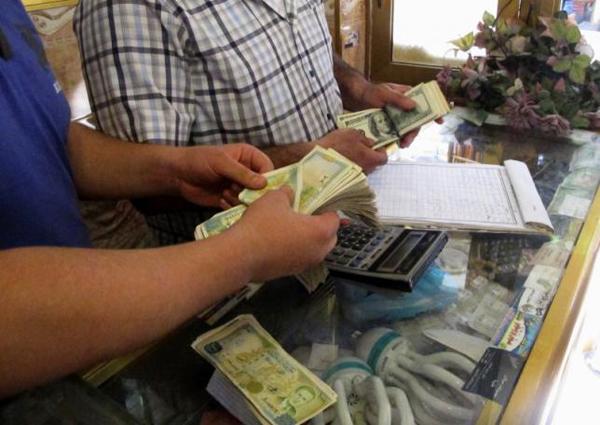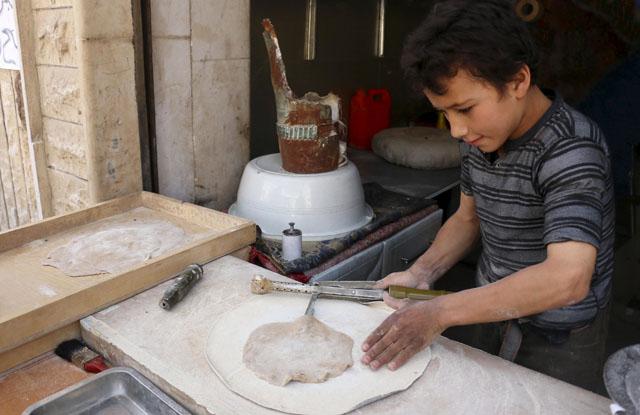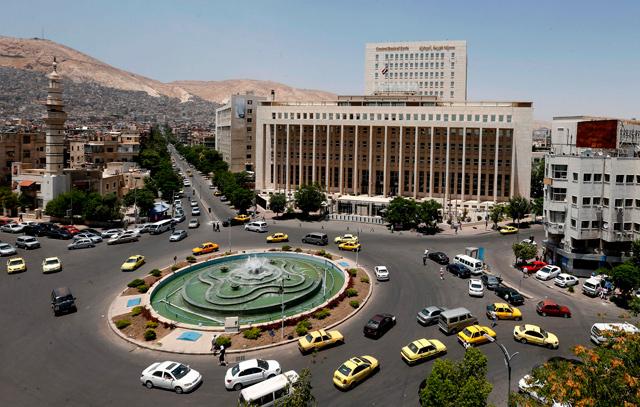You are here
Rapid currency slide chokes business in Egypt
By Reuters - Oct 31,2016 - Last updated at Oct 31,2016

Egyptian youth play music on a street in Cairo, Egypt, on Monday, as the country is struggling with high inflation and youth unemployment (AP photo)
CAIRO — Business is grinding to a near-halt in Egypt as companies struggle to keep pace with a rapid slide in the black market value of the pound. Factories are halting production, shops are running low on stocks and a sense of panic is spreading.
Bassem Hussein, whose company imports, processes and packages coffee and spices, stopped buying two weeks ago as the depreciation of the Egyptian currency gathered pace. His goods are still on sale at supermarkets but no more stock is on the way for now.
"No one knows what is happening. We stopped buying and selling two weeks ago. We're only doing retail," said Hussein, a manager at family-run Interfood. "It's not logical and it's not just us, it's all merchants."
The Egyptian pound has been falling on the black market since the 2011 revolution drove away tourists and foreign investors, vital sources of hard currency in an economy that relies on imports of everything from food to luxury cars.
But firms say a dramatic slide in the last few weeks has left them paralysed, unable to plan from one day to the next.
Black market traders were buying dollars at 17.5-17.85 pounds on Monday and selling them to importers at 18-18.2, representing a two-pound slide in a single week and five-pound slide on the month.
The pound is now worth half as much on the black market as it is in the banks, where the official rate remains fixed at 8.8 but where dollar supplies are strictly rationed.
Foreign reserves have dwindled from $36 billion before 2011 to about $19.6 billion in September, despite Egypt receiving tens of billions of dollars in aid from Gulf Arab allies.
Capital controls introduced in early 2015 to prioritise essentials such as wheat have forced importers on to the black market, where the rate has depreciated fast.
Companies have complained for nearly two years, with the dollar crisis already squeezing smaller firms out of business.
But the crisis entered new territory last week as two of Egypt's largest listed manufacturers raised the alarm.
Cigarette-maker Eastern Company warned that its raw materials stocks had halved and that it may have to halt production and sales if dollar shortages persist.
As part of efforts to slash the trade deficit it blames for distortions in the currency market, the government has raised customs duties on luxury goods and set stricter import rules.
Trade and Industry Minister Tarek Kabil has said local production rose 20 per cent this year, to substitute for imports.
But manufacturers say they rely on imported components and parts they buy with dollars obtained at black market rates.
"We used to feel it weekly, now the impact is daily. It's not just wood, it's all our materials, 50 per cent up on a month ago," said Ibrahim Hashem, who runs a furniture factory in Alexandria and buys imported wood priced in dollars.
"There is a limit... It may reach the stage where I do my calculations and find that no one will buy furniture at the price I would need to charge... It will reach the stage where no one will make or buy or sell anything."
With the budget deficit at 12 per cent in the 2015-16 fiscal year and currency markets facing severe distortions, Egypt reached a preliminary deal with the IMF in August for a $12 billion three-year loan to support an economic reform programme.
As part of those reforms, Egypt is widely expected to ditch its currency peg for a more flexible exchange rate mechanism.
Central Bank Governor Tarek Amer has said he would consider floating the pound once reserves hit $25 billion, but that target looks ambitious to some economists who say Egypt is burning through dollars as fast as it gets them.
Saudi Arabia, the UAE and the World Bank have poured about $3 billion into Egypt's coffers in recent months, but rising prices and periodic shortages of state-subsidised foods have forced the government to increase costly imports.
A dispute with its erstwhile financial backer, Saudi Arabia, saw a deal to supply Egypt with refined oil products suspended this month, adding $500 million a month to government spending.
Related Articles
AMMAN — Battered by war which has inflicted incalculable damage on industry, infrastructure and economy, Syria's currency hit new lows last
Concern over army setbacks against insurgents in recent weeks drove black market rates for the Syrian pound to a record low against the dollar on Wednesday, dealers and bankers said.
DAMASCUS — Syria's central bank devalued the Syrian pound on Wednesday giving in to weeks of depreciation on the black market as new US sanc














